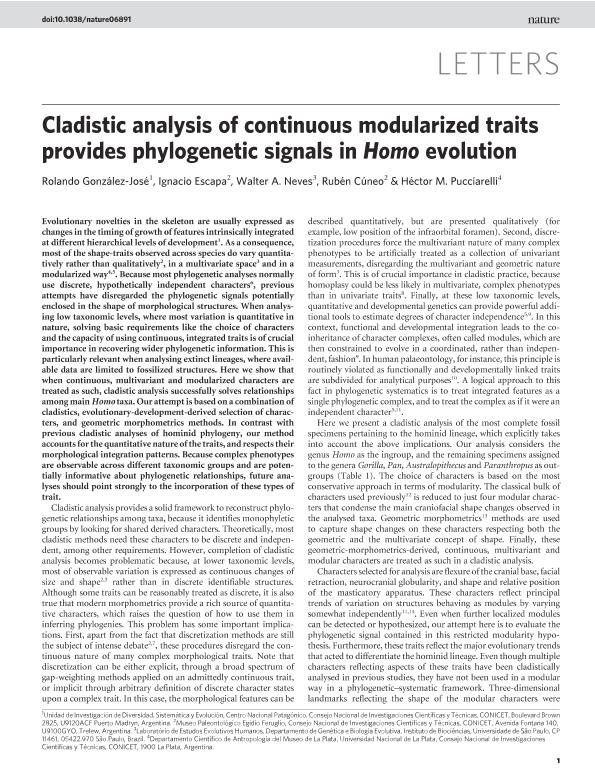Artículo
Cladistic analysis of continuous modularized traits provides phylogenetic signals in Homo evolution
González José, Rolando ; Escapa, Ignacio Hernán
; Escapa, Ignacio Hernán ; Neves, Walter A.; Cúneo, Néstor Rubén
; Neves, Walter A.; Cúneo, Néstor Rubén ; Pucciarelli, Hector Mario
; Pucciarelli, Hector Mario
 ; Escapa, Ignacio Hernán
; Escapa, Ignacio Hernán ; Neves, Walter A.; Cúneo, Néstor Rubén
; Neves, Walter A.; Cúneo, Néstor Rubén ; Pucciarelli, Hector Mario
; Pucciarelli, Hector Mario
Fecha de publicación:
06/2008
Editorial:
Nature Publishing Group
Revista:
Nature
ISSN:
0028-0836
Idioma:
Inglés
Tipo de recurso:
Artículo publicado
Clasificación temática:
Resumen
Evolutionary novelties in the skeleton are usually expressed as changes in the timing of growth of features intrinsically integrated at different hierarchical levels of development. As a consequence, most of the shape-traits observed across species do vary quantitatively rather than qualitatively, in a multivariate space and in a modularized way. Because most phylogenetic analyses normally use discrete, hypothetically independent characters, previous attempts have disregarded the phylogenetic signals potentially enclosed in the shape of morphological structures. When analysing low taxonomic levels, where most variation is quantitative in nature, solving basic requirements like the choice of characters and the capacity of using continuous, integrated traits is of crucial importance in recovering wider phylogenetic information. This is particularly relevant when analysing extinct lineages, where available data are limited to fossilized structures. Here we show that when continuous, multivariant and modularized characters are treated as such, cladistic analysis successfully solves relationships among main Homo taxa. Our attempt is based on a combination of cladistics, evolutionary-development-derived selection of characters, and geometric morphometrics methods. In contrast with previous cladistic analyses of hominid phylogeny, our method accounts for the quantitative nature of the traits, and respects their morphological integration patterns. Because complex phenotypes are observable across different taxonomic groups and are potentially informative about phylogenetic relationships, future analyses should point strongly to the incorporation of these types of trait.
Palabras clave:
N/A
Archivos asociados
Licencia
Identificadores
Colecciones
Articulos(CCT - LA PLATA)
Articulos de CTRO.CIENTIFICO TECNOL.CONICET - LA PLATA
Articulos de CTRO.CIENTIFICO TECNOL.CONICET - LA PLATA
Articulos(CCT-CENPAT)
Articulos de CTRO.CIENTIFICO TECNOL.CONICET - CENPAT
Articulos de CTRO.CIENTIFICO TECNOL.CONICET - CENPAT
Articulos(SEDE CENTRAL)
Articulos de SEDE CENTRAL
Articulos de SEDE CENTRAL
Citación
González José, Rolando; Escapa, Ignacio Hernán; Neves, Walter A.; Cúneo, Néstor Rubén; Pucciarelli, Hector Mario; Cladistic analysis of continuous modularized traits provides phylogenetic signals in Homo evolution; Nature Publishing Group; Nature; 453; 7196; 6-2008; 775-778
Compartir
Altmétricas



